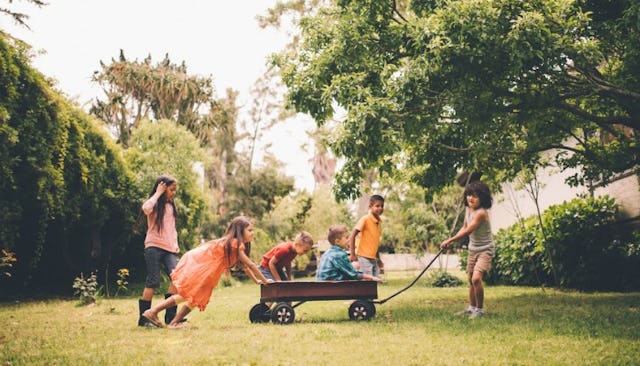Let's Step Back During Playdates

When I was a kid, playdates were simple affairs — if they could even be considered affairs at all. They consisted of going to a friend’s house and being like, “Hey, wanna play?” and they’d be all, “Sure!” and then you’d run around outside or build a fort in their basement or play Nintendo until dinnertime. You’d only see the mom when she popped in to say things like, “No more popsicles,” or “Did you get into Dad’s box of Twinkies?”
These days, playdates have morphed into carefully orchestrated events, with agendas and preplanned snacks and craft projects. It’s less spontaneous and more “have your people call my people.” Parents are turning them into occasions, like mini cocktail parties, only with organic juice boxes and whole wheat cheddar crackers and schedules to adhere to.
As for me, I lean heavily toward the old-school approach (waves cane, yells at kids to get off my lawn). I vastly prefer relaxed, unstructured, let-them-be playtime, and I’m willing to bet my kids d too. So unless our children are chasing each other with knives or trying to start a fire or beating one another to a bloody pulp, I’m not going to intervene. I’m going to let them do their thing while I do mine. Some of the most valuable lessons in personal interaction happen when kids are allowed to figure out the art of socialization for themselves, and we need to step the hell off and let it happen.
Remember what it was like to play with your friends? For the most part, it was super fun, peppered with the inevitable disagreements about who got to go first and who got to use the best sword/doll/costume/video game controller. But when those disagreements happened, you resolved them among yourselves because you knew if you tattled, your mom wouldn’t gently mediate; she’d just say it was time for your friend to go home.
Despite your differences in opinion over what to play, neither you nor your friends wanted to stop playing. So you worked it out. Sure, there were threats of “I won’t be your friend anymore if I don’t get to be Malibu Barbie,” but how many solid friendships actually ended forever as a result of a playdate argument? We resolved our own problems because we had to, and in turn, learned how to play well with others — a skill that we (well, the majority of us) carried with us into adulthood.
It’s our job as parents to give our kids the framework — a rundown of the basic structure of how to treat people. Take turns. Make sure everyone is included. Give everyone a chance to speak. But once they know the rules, it should be up to the children to decipher how to successfully follow them. Through experimenting — and yes, through the occasional failure — they learn how to negotiate, share, listen, and compromise. Kids have more ability to figure these things out than we give them credit for, and by denying them the opportunity to work out social snafus for themselves, we’re denying them learning experiences that will teach them how to navigate the world for the rest of their lives.
As parental authority figures, stepping in is sometimes necessary if someone is legitimately getting hurt or feeling sad. But for the most part, stepping back is where it’s at. Let’s allow our kids to structure their own playtime and decide what they want to do and learn how to solve any problems for themselves. We have too much to do anyway without adding “child conflict supervisor” to the mix.
So helicopter your way on over to my couch, and let’s have a chat and some chocolate. Now that the kids are occupied, I’ll show you where I keep the good stuff.
This article was originally published on